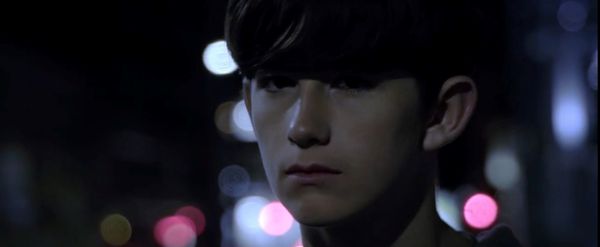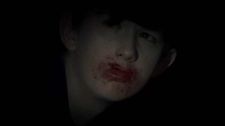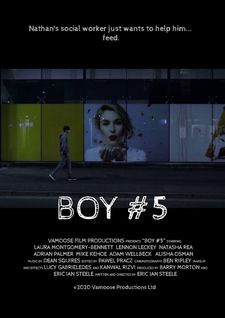 |
| Lennon Leckey in Boy #5 Photo: courtesy of Frightfest |
One of the great things about Frightfest is its ability to keep on finding high quality independent films which might otherwise go under the radar. Boy #5 is a vampire film, which might sound like more of the same, but it has a very distinctive character and strong underlying themes. It’s impressively produced and features one of the best performances of the festival, from newcomer Laura Montgomery Bennett, who plays a social worker taking on the case of a sullen teenage boy (played by Lennon Leckey) found on the streets. Shortly before the festival I met up with Laura and director Eric Steele to chat about the film. Eric began by explaining the unusual circumstances in which it entered development.
“We’d worked on a couple of short films, myself and my co-producer Barry Morton, and I’d directed a short film before this but I was planning for ages to make a feature. And it wasn't this feature. It was a crime drama. And then things happened, as they do, and at the last minute that we knew that wasn't going to happen in the immediate future.
“So I’d had this idea circulating for quite some time. We spoke about it. So yeah, we could do this with the resources that we had. So the script was very much written for our project level, and it just grew out of there. I’d always wanted to do something like that and it just seemed like the right thing to do or our first feature.
It also seems that it would be an easy film to shoot under Covid conditions, I suggest. Was it actually shot like that or was it made beforehand?
Eric, slightly flustered, admits that he can’t remember when shooting started.
“September 2019,” says Laura helpfully. “So it was before we'd ever heard of Covid.”
I ask her how she got involved?
“Well,” she says, “I've always wanted to do acting and be involved in something like that. And my sister had seen an advertisement saying that they were having an open audition. So Eric was having open auditions for the feature that he just mentioned a moment ago. And my sister encouraged me – because I don't actually live in Manchester anymore, I live in Warwickshire – my sister encouraged me to come up to Manchester and take part in the audition.
 |
| Caught red-faced |
“I was really shocked when I got the call from Eric saying that he’d enjoyed the audition but before we filmed that feature, he'd like to film this smaller feature that he had in mind first. He said it'd be a good opportunity to see how we work together. Not just me, but everybody in the team. To see how we all gel, making sure that he's got the right people working with him.”
So what was it that Eric saw in Laura back then?
“We had huge auditions,” he says.” Because I didn't know which way we were going to go with this film. We knew that we definitely would do the other film do but we also wanted to do this one. So we had about 70 actors, over two nights. We got them all together and basically just got them to improvise. And Laura just stood out immediately. I'm not saying that because she’s here!” He laughs. “And both myself and my producing partner, we were talking about it on the night, and then thankfully it worked out and we got to work with her, and yeah, the rest is history.”
I ask Laura if she had any acting background at all beforehand, even at an amateur level.
“Absolutely nothing whatsoever,” she says. “Zero. Even though I've always – since being a little girl – I've always wanted to do it. But the area I'm from, the family I'm from, it's not a thing. You don't do that. And I had my first child when I was 18, so it was like, there was no way to be doing silly things. I’ve got to get a proper job. I've got bills to pay and mouths to feed. I've just been working all the time.
“I’m working in a school at the moment, for the last three years. And then it was during the summer holidays that there was this audition that my sister noticed, and that's why she encouraged me to do it. Because, she says, ‘Otherwise you would say no because you've got to go to work. You've not got that excuse. I'm not taking no for an answer. I'll see you later!’” She laughs at the memory.
So did working in a school help her to get into her character?
“Probably I don't know. I was a family support worker in Manchester for a few years and I worked for a charity, and then I worked for the Manchester City Council’s Children and Families department. And so I think the social work side of that was easy to get into because I had some understanding, some background knowledge of what a social worker does, although I wasn't one, I just worked alongside them
“ And then I think it was just the the caring side of the character shone through to me out of the script. When I first read the script I could see how much she cared. I've always done caring roles in my real life. And so it was easy to put that into, into the character of Marjorie.”
I tell her that it seemed me that a lot of what the film is about is the balance between caring for a child like that, and not getting drawn in too much and losing too much control of one’s own life.
“Yeah. I think she wasn't in the best place really, when Nathan came along,” Laura says, referencing the fact that her character had recently had to deal with the death of another boy in her charge. “She might not have been the best one to give him to really. But actually, she was the right one. Because she was what he needed.”
I ask Eric how he researched that side of the film.
“I didn’t do a great deal of research,” he says. “But my background is in public service, so I'm aware of how local authority departments operate. But the script is a very stripped down story. So apart from the basic office dynamics that exist between Marjorie and her boss George [Adrian Palmer] and a co-worker [Natasha Naomi Rea], it’s mainly just the story of these two people, one of whom just happens to a vampire. So it was more about relationships.”
I tell him that I found the specificity of the film appealing in the way that it grounded the fantastic elements, and that the film reminded me a bit of George Romero's Martin. How did he decide what he wanted to include where vampirism was concerned, and what he wanted to leave out?
“I've always been fascinated by exploring the scientific basis for superstitions,” he says. “Martin is a great example because of course, you’re never sure if he is or if he isn’t a vampire. I thought it would be interesting to have the social services just have to deal with a vampire. And, you know, if they were confronted with solid scientific and medical evidence of this boy's existence, how would they deal with it?” He laughs. “Not very well. That was that was kind of the basis for how I started out with this idea of it being brought into social care. I suppose I'm slightly influenced by the medical horror films of the Seventies, but also just to lay that supernatural metaphor of the vampire bare and start unpicking and start exploring what it is that people find fascinating about it.
It's also interesting on another level, looking at how systems cope when they're faced with cases that just don't fit and don't make sense.
“Yeah, I think there was that, certainly. It's always interesting to see how an institution affects individuals, and how, you know, institutions trample over individuals sometimes. Not out of malignancy but just out of the day to day necessities of operations. So I guess that was in there as well. And certainly with the character of Elaine [the aforementioned co-worker], who comes in halfway through and approaches it from the aspect that this is just another child, basically, so let's get him through the system – whereas Marjorie has a much more personal connection to him.”
How did the actors work together to build that relationship?
“We did a small amount of rehearsal,” says Eric. “I’m not very big on rehearsals because I want to just capture things in the moment. And I think you can get a terrific performance in rehearsal and not film it and that’s the best it’ll ever be. Especially when dealing with young actors like Lennon. I wanted to get his genuine reaction. So we I think we did a small read through of most of the script, didn’t we Laura?
“Yeah, we did,” she says. We all met up but rather than rehearsing scenes and going over lines, we were getting to know each other and kind of building that relationship, which happened to kind of gel really quickly. Wouldn't you agree, Eric, that we all just seem to get on well? Even though I'd never met this young lad before, or his mum – his mum was always there to chaperone him because of his age. But it was like we'd always known each other.
“He's such a lovely, well mannered, engaging young lad. And it was it was easy to form that bond with him straight away, because he was just so lovely. And his mum was so lovely. And so yeah, we got on excellently straight away. I did feel protective towards him, just because of his age, and I don't know, especially when he had the makeup on and the massive brown eyes and you just, I think anybody would. I do always feel protective with the children I work with in the school that I work in. I'm very protective there. It's just I think that's one of my natural features that just came across with Lennon. But yeah, he was brilliant to work with.”
With any film, there's always time pressure, and with small films that can be particularly difficult. Did they have much time to work through things when they were shooting?
 |
| Boy #5 poster |
“Time pressure was an interesting one,” says Eric. “In one of our locations, which was the main care home, it was due to be demolished the week after we were filming. And the same was true for the office as well – halfway through shooting at the office, we were told it was going to be redecorated in a totally different colour. So that caused a little bit of pressure as well. I think the second day of the care home was was the most pressured day. We just tried to do it very quickly. We ended up shooting 20 scenes that day, which included the final scene, which was all of the special effects and everything. so it was challenging.”
There's relatively little blood and gore in it, considering what it's about, and a lot of the violence is actually offscreen. Was that partly a practical decision or was it mostly about wanting to have people imagine what happens rather than seeing it directly?
“Maybe a bit of both,” he says. “We were limited practically with what we could do. Although our editor [Pawel Pracz] did some fantastic composite shots in this film. Again, I'm just such a big fan of Romero’s Martin and he manages to make that quite compelling without...” He Pauses. “There is gore in it but it’s not throughout the entire film. So yeah, it was partly forced upon us by reality but I think it worked out well for the film.”
I ask Laura if, back when she used to dream about acting, she ever imagined being in something like this.
“I love watching TV and films across the spectrum. I’m limited to one specific genre or style that I enjoy, because there's just so many different types,” she says. “But I must admit, I'm not a fan of horror, just because I'm so soft. I don't like being scared. If I think that something might scare me then I won’t watch it. If I do watch it, I'll need to watch something really, really lovely afterwards, such as Disney or Friends or something like that. And so no, I didn't ever imagine getting into the sci fi or horror type of film, but I've really enjoyed it.
“It has actually helped me. People say to me, you know, when we're trying to choose a film together as a family or whatever, they’ll suggest a horror movie and I’ll be like ‘No, I'm still in the room, guys, that wouldn't be polite,’ and they’re like ‘No, you should be used to it. Now you know, what goes on behind the scenes, you know how it's done, you understand the makeup, the special effects and whatever. It's still a great film!’”
Is she hoping that this will be the start of an acting career?
“Oh, I would absolutely love that. I really, really would love that. We'll see how it goes. I wouldn’t put my house on it or anything like that. But yeah, it's so much fun to do. I had such a really great time doing it. And it's so interesting to see. Because I am such a big fan but I didn't ever know what went on behind the scenes. I'd never been in that situation before. You know, the amount of different takes you have to do from different camera angles and making sure that your hand is perfectly where it was exactly the last time.” She kept getting in trouble for forgetting what she was doing with her hands, she says. “So you know, little things like that occurred to me to learn and just little nuances that you don't really understand when you're just sitting there in front of the television. It's really interesting.”
So how did the two of them feel when the film was picked up by Frightfest?
“Shocked in a good way,” says Eric. “It’s brilliant. I’m just really looking forward to it. This is the first film festival it’s been selected for.”
“Oh proud, so proud of everybody involved with it,” says Laura. “It was an eye opener for me to realise how many people are involved with each part of production. And so I'm so proud of every single person, so happy for every single person. Because it was my first thing it’s brand new to me and perhaps it's nothing more than a hobby for me, we don't know at this stage. But for all these other guys, they’re all professional, they’re all hard working. They want it to be their career full time. And they're so passionate about it. And so to get these results, it's amazing. I’m absolutely thrilled for them. Because even I've heard of Frightfest – so when Eric phoned me and told me I was like ‘I've heard of that!’ So yeah. I'm just so happy for everybody involved with it.”





















